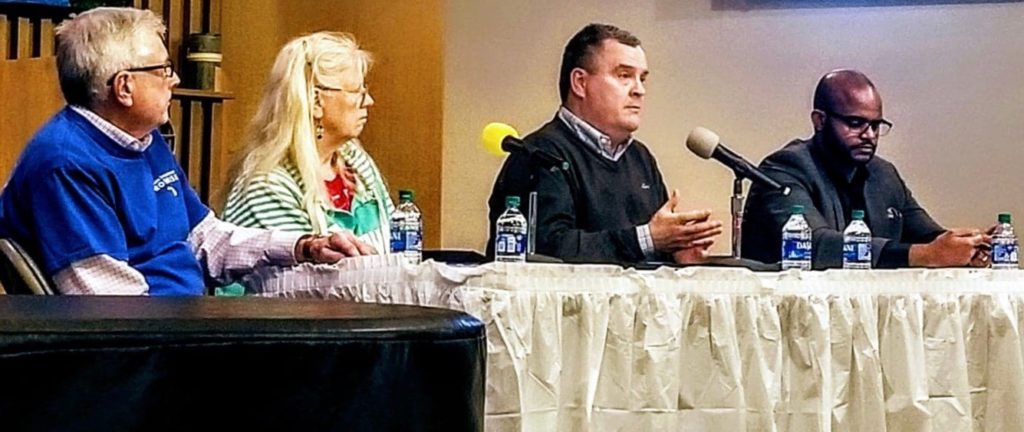By Jeffery L Carey Jr.
A hearty dose of skepticism and dejection was the overall attitude at an auto insurance town hall Tuesday, March 3. Hosted at the Unitarian-Universalist Church off South Ballenger Highway, the town hall discussion dove right into the potential negative outcomes of the newly crafted Michigan Auto Insurance No-Fault reform law set to go into full effect July 1, 2020.
[An EVM story of Jan. 28 presented a another view of the bill passed in May, 2019, noting the bipartisan nature of the move to reform auto insurance and the fact that the state has among the highest auto insurance rates in the nation.The article summarized that the bill represented an effort “to provide lower rates for Michigan drivers, to protect insurance coverage options, and to potentially strengthen consumer protections”]
The town hall participants, however, presented a far different perspective on the reform package.
All four panelists warned the more than 100 attendees that the new insurance legislation will lead to what they predicted would be an untold numbers of Michiganders filing medical bankruptcy, as there will no longer be an option for unlimited lifetime protection.
“I’m sorry to be the bearer of all this bad news,” stated panelist Brian McKenna of Sinas Dramis Law, where, according to the firm’s site, McKenna “focuses his work on representing injury victims and claimants experiencing insurance benefit denials which they are entitled to.”
The other panelists were Devin Hutchings, president of the Eisenhower Center of Ann Arbor which specializes in traumatic brain injury therapy and recovery; Sharon Mumasmith, a Michigan resident whose son experienced a traumatic injury; Ron Krueger, another Michigan resident whose son experienced a traumatic injury; and moderator Martha Levandowski of the Coalition Protecting Auto No-Fault (CPAN).

Panelist at the auto insurance town hall (from left) Ron Krueger, Sharon Mumasmith, Brian McKenna, Devin Hutchings (Photo by Darlene Carey)
“Reform is not the right word,” said McKenna as he broke down what Michigan’s no-fault insurance previously covered and how the public stands to lose protections under the new legislation. He stressed auto owners would have to change their insurance whether they wanted to or not, and that they could “keep unlimited, but it’s not truly unlimited. It’s unlimited with restrictions.”
McKenna also stated that under the old insurance coverage, a driver had immunity from charges if they caused the accident because it was covered by the no-fault, but under the new law there are no protections.
“This is a cost shift to our taxes,” Hutchings said as he described how the new law is likely to force many drivers onto Medicare and Medicaid, especially after they have gone bankrupt due to their medical expenses and loss of income.
“Medicare and Medicaid won’t pay for physical therapy,” claimed Hutchings as he validated a statement made by a concerned attendee of the town hall who stated that she had to buy additional coverage on her insurance because Medicare and Medicaid would not cover her. The impact of this, suggested Hutchings, would be devastating to traumatic injury patients who all required long-term physical therapy.
Hutchings also stated this would have a dramatic impact on the quality of care people receive as it will force quality facilities, like the Eisenhower Center of Ann Arbor, to close their doors as the state mandates the allowed pricing tiers of treatments.
[Editor’s note: Following the publication of this story, EVM heard from communications strategist Scott Swanson, president of Moonsail North, who said that he works with CPAN and Hutchings. According to Swanson, “Devin didn’t say that Medicaid and Medicare don’t cover physical therapy **in general** — he said that they wouldn’t cover Physical Therapy for patients like Mr. Krueger’s son, who still requires PT after 20+ years to minimize rigidity and muscle atrophy. He also said that Medicare and Medicaid won’t pay for the kind of post-acute inpatient rehabilitation that is offered at the Eisenhower Center.”]
Both McKenna and Hutchings assailed the insurance companies for having lobbied the Michigan Legislatures and for the handful of legislators who “passed the bill secretly in the dead of night.” They added that most of the representatives that passed the legislation had little time to read it and did not understand what they were signing.
This spawned a comment from attendee, Jim Rhoades from ABATE of Michigan , who spoke of the potentially crippling effect the new law will have on motorcyclists. This prompted the panelists to discuss how the new legislation forces a motorcyclist in an accident to be covered not under the premium of their choice but by the cap the motorist had chosen for their vehicle instead.
This means that if motorists has chosen a cap of $50,000.00 for themselves on their auto insurance policy and that person is involved in an accident with a motorcyclist, then the maximum coverage the motorcyclist would have for their own expenses would also be limited to $50,000.
Hutchings also stated, “Sorry. I don’t have any positive things to say.” This was in lieu of his discussion on how the insurance law had already gone into effect on some levels and that his facility was treating people with extreme complications. “The insurance companies are not helping the way the legislation said they would.”
The disparaging remarks against the insurance companies sparked a retort from an audience member who was himself an insurance salesperson. He argued auto insurance rates keep going up because medical facilities, like the Eisenhower Center of Ann Arbor, don’t charge the same rates as other facilities for the same injuries.
He argued, “When a child falls out of tree who is uninsured and breaks their arm, the hospital charges them $500, but BlueCross and Medicaid will pay that same incident at $1,000.” The man went on to claim that the hospital then charges an auto insurance company $3,000 – $5,000 for a broken arm in an auto accident. “Where’s the logic?” he said.
Hutchings responded by saying that it was against the law to charge different prices and that his facility would charge the same per treatment for a person who was in a car accident or an accident unrelated to motor vehicles.
McKenna added that it gets worse because the insurance companies have “hired witnesses” who testify that the injured person is fine and doesn’t need treatments. “They’re creating millionaire’s who are hired witnesses that work for the insurance companies.”
Sharon Mumasmith and Ron Krueger both described the devastation caused by the accidents their children experienced. Without no-fault insurance, neither would have been able to afford even a small percentage of their long-term care.
“I have a son who is totally dependent on others as the result of an auto crash 30 years ago when he was 18,” Krueger said. “The former no-fault law has afforded him a decent quality of life all these years. He lives in an excellent residential facility in Ann Arbor. The bill for his care and therapy now tops $5 million.”
Some other aspects that the panel claimed is inaccurate about the new Michigan insurance law were that the insurance commissioner has no authority over premiums. Michigan is a “file-and-use” Terri Cross stated. This means companies have to submit rate information to the Michigan Department of Insurance and Financial Services (DIFS), but it just gets, literally, filed because they don’t have the personnel to look through thousands of pages of documents from each insurance company, she said.
The second is that companies can continue to employ non-driving factors in determining rates. The new law includes cloudy language about creating “territories” that imply there is more fairness. But, as Krueger warned, “nobody knows what difference that will make, if any.”
Banner photo of town hall participants eager to speak by Darlene Carey.
EVM Staff Writer Jeffery L. Carey, Jr. can be reached at jlcareyjr@hotmail.com. EVM Staff Writer and photographer Darlene Carey can be reached at darcar7@gmail.com.








You must be logged in to post a comment.